Max Weber’s Personal Life, 1886-1893
A longer version of this essay is
part of my article “Max Weber’s Dissertation.” History of the Human Sciences 16 (2003).
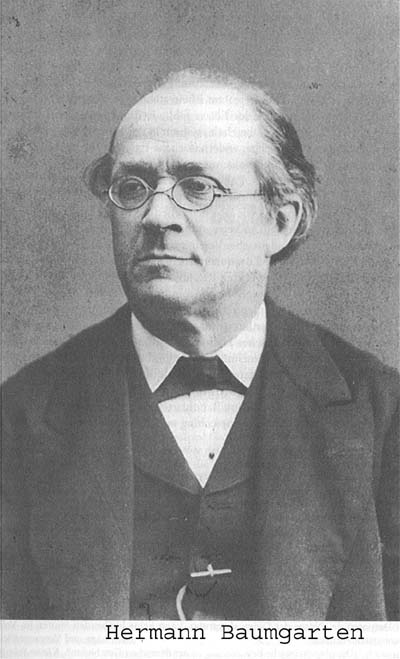
The flow in which Max Weber composed his dissertation and emerged as a bright academic star stands in stark contrast with the ebb in his most significant personal relationships. His personal situation was fraught with several issues that proved difficult to deal with. Foremost among these issues were his romantic interest in Emmy Baumgarten and his tension-filled relationship with his father.
Shortly before writing his
dissertation, Weber developed a romantic interest in his cousin Emmy Baumgarten
(1865-1946). The Baumgartens, who lived in
Strasbourg, were related to the Weber’s through Emmy’s mother, Ida, an
elder sister to Max’s mother, Helene. Ida’s husband was the historian Hermann Baumgarten, who exerted influence on
Max, at least politically, beginning with Max’s student years, during
which he and Hermann Baumgarten entertained
political discussions on many an occasion.[1]
One of Ida and Hermann’s children, Otto, who later became a professor of
theology, became a close personal friend to Max during his early student
years. Otto then not only was one of Weber’s three invited opponents at
Max’s dissertation viva voce, but also remained close to Max later
on.[2]
Emmy, a younger sister to Otto, entered into the picture when Max took an
initial interest in her during his stay in
Ida’s motherly heart sensed what was going on with conflicting emotions. She loved this unusual nephew like a son, as did her husband, but she feared the disaster of a love match between such close relatives. And besides—was her delicate daughter not an entirely too fragile instrument for the hands of this young colossus, gentle though they might be? Would he not crush her spiritually? Moreover, he was still so young, only at the beginning of his career, and marriage was in the distant future. And so, to forestall danger, Ida sent Emmy to Waldkirch [a town close by] to stay with her brother Otto for a while. But Weber followed her there, and the young people spent a few days of sweet closeness in the poetry of spring. They felt that they were in love with each other, but no word was spoken, and they remained at a chaste distance. Only at parting did a warm stream of tears moisten the young man’s eyes for an instant. Otherwise everything else remained veiled; even the knowing mothers kept silent.[4]
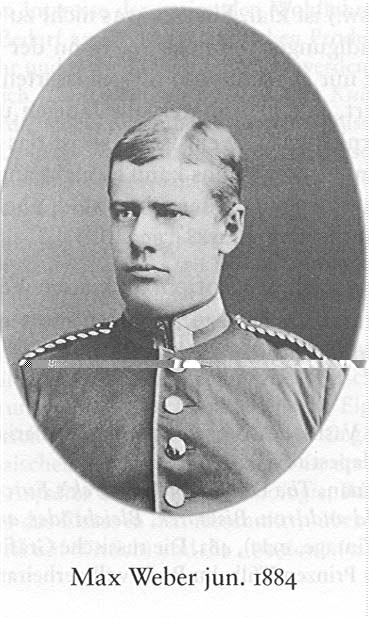
Weber had been in love before, but up until the time he
became enchanted with Emmy his relation to the opposite sex during his
student years can only be described as awkward.[5]
After 1887, the two would not see each other again until 1892.[6]
The fact that nothing came of Emmy and Max’s relationship in the end and
that it never proceeded to the stage of engagement[7]
does not mean, however, that it merely fizzled out, without trials and
tribulations. When the two met in Waldkirch in
1887, Max was a bachelor almost twenty-three years of age who lived with his
parents. He was still years away from being able to establish a much-desired
independent household. Emmy, on the other hand, was already afflicted with
an emotive illness that had affected others in the Fallenstein
line.[8]
To make matters worse, she was drawn deeper into this disorder over the
following years, to the extent that she was admitted (with her sibling Anna)
to a
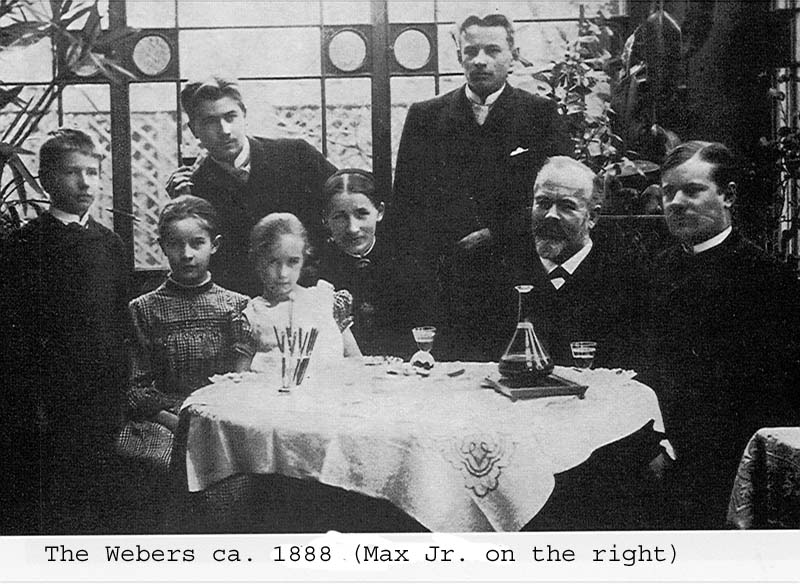

In all, as published in his Jugendbriefe, Weber’s exchange of letters with his “dear Emmerling” and “darling,”[12] as he tenderly called her, continued over roughly an eight-year period. During this time their communications remained tentative and ridden with anxiety about their relationship and feelings for each other.[13] In tone, Max’s letters became increasingly brotherly rather than amorous. Nevertheless, it appears that well into the early 1890s Max remained emotionally tied to a person who was considered “promised” to him[14]—a term connoting ethical duties for both parties—yet who suffered from a nervous disorder, perhaps acute depression.[15] He gradually seems to have realized that he could not shoulder the responsibility of being her spouse, perhaps not only in the sense of what was expected of a proper husband in patriarchal Imperial Germany,[16] but also in terms of being a mate, companion, and confidant. Could it be that he wanted to be part of a relationship somewhat unlike the one he had been witnessing between his parents for some time?[17] In any case, his heart-felt concern for Emily shines through all of his letters to her, and he surely must have worried about her and their relationship a great deal throughout those years. Thus, his romantic life was under a dark cloud virtually for the whole time he was involved in studies for his dissertation, and beyond.
It did not help matters that
Weber’s domestic situation was not free from tension either. Much has been
made of the differences between Max’s father, Max Weber Sr., and his wife,
Helene, née Fallenstein. In the Weber family,
Max’s father occupied the role of the paterfamilias. A descendant of Westphalian
linen merchants, Max Sr. rose to prominence from being a salaried city
magistrate in
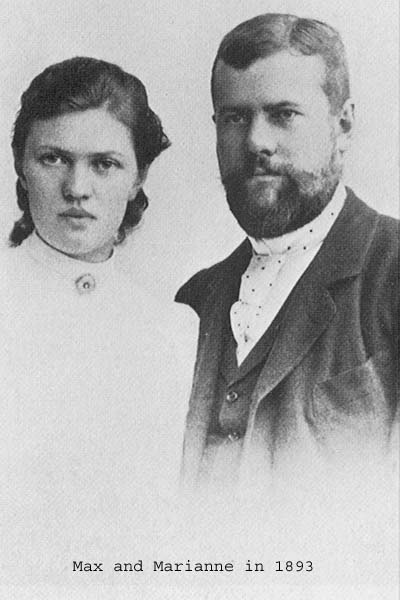
Yet there were additional
complications in the Weber’s family life that have not been given nearly
as much attention as the disputes between the father and mother. Not only
alienation from his father, but also financial dependency on him, coupled
with uncertain prospects in his professional career and employment,
characterized Max Jr.’s life well into the
1890s. The antagonism that deepened between the Max and his father did not
prevent the son, in the early 1880s, from initially wanting to become what
his father had been—a salaried official of the state (Beamter)
in the Prussian mold[26]—and
following his footsteps by choosing the same academic career (law). The son
was also not above designating himself prominently in his application as Max
Weber Junior when seeking the position of a legal advisor to the
chamber of commerce in
All the while, except for the first three and the sixth semester of his studies, and his absences while in the army, the junior lived in the tension-filled parental home until he married and moved out when he was almost 30, depending largely on the parents’ pocketbook for financial support. Marianne Weber’s biography of Max and Max’s own letters, particularly to Emmy, are replete with references to Max’s uneasiness about his financial and professional uncertainty. Both of his parents, and especially his father, apparently wished quite strongly for him to get done with his studies and to move on to the status of a self-supporting adult.
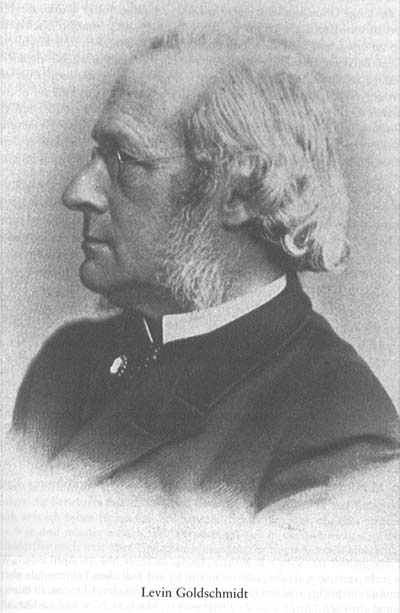
In the fall of 1887, just as Weber was beginning to write the initial essay for Levin Goldschmidt’s seminar that would be the foundation of his dissertation, Max wrote to Emmy that on the occasion of a family get-together, “it was as if my family had gone to Heidelberg only to bombard me from a short distance with heavy artillery, my father through Fritz [Baumgarten; one of Max’s cousins], my mother through letters and your father. When was I going to take the doctoral examination? My father, as I know well, is quietly disappointed that I have not managed to do that more quickly. I don’t want to be found wanting in this respect, do I?” Continuing on the issue in a later part of the same letter, he wrote, “it is a strange feeling to gradually outgrow one’s student shoes but still have to wait a long time before being one’s own master, at least for me, and yet I have to swallow this thought almost daily.”[28] The double burden of estrangement and financial dependence, which made his life increasingly gloomy and constrained, as Marianne commented,[29] continued. In 1891, Max wrote to Emmy’s father, “only with reluctance do I think of the transition from an expectant and unsalaried junior barrister and magistrate’s assistant to being an equally expectant and unsalaried university lecturer.”[30] He could look back to his period as junior barrister “only with horror,“ not having been able to shorten this “four-year pilgrimage by even one minute,” and abhorring the fact that it still might take long until he was “firmly established somewhere,“ he wrote to Emmy early the following year.[31] The father, meanwhile, still would not finance an independent household for Max, and kept complaining that the junior had taken too long to finish his Habilitation.[32]
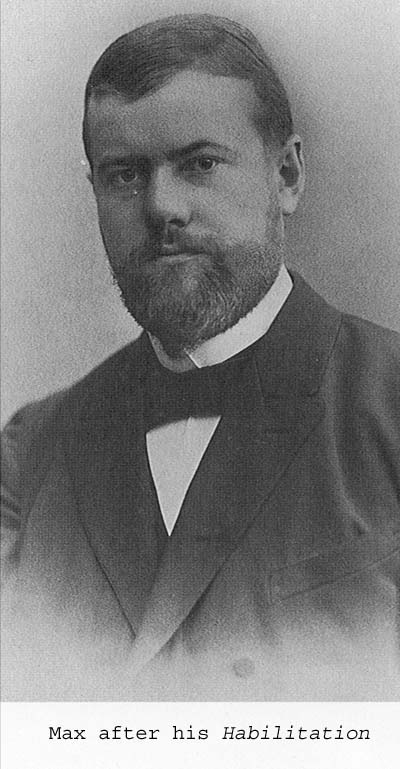
Weber later bitterly commented on the results of his father’s lack of
financial commitment, noting that when he was at the age his brother Arthur
got married, that is, at 25 (in 1889), “I had to relinquish my love [to
Emmy] because my father would not have provided the financial means to start
a household.”[33]
In the process of getting married to her, Marianne tells us that Max then
“gave vent to everything he had endured silently in his parental home.”
“For years I have realized with infinite bitterness that I was unable to
obtain a position that would give me an independent income . . . The only
thing that attracted me was my own bread, and the fact that it was denied me
made my family home a torment. Now the end is in sight.“[34]
This end came with Max’s marriage to Marianne, who brought a substantial
amount of inherited money into the marriage,[35]
in 1893, and his professorship in
The problem of financial
dependence was compounded by the fact that Max was in the habit, at least
occasionally, of spending freely. For early on in his career, this pattern
was noted by several parties. Marianne mentioned it for his second semester
when she made the somewhat ominous remark that “he could not balance his
budget even in later student years.”[38]
At his parents’ request, he returned home to recoup the great expenses of
his student and military life, for, as Max’s mother, Helene, put it, in
Heidelberg and Strasbourg he had “adopted a rather grandiose style of life
. . . He squandered an unconscionable amount of money.”[39]
Soon after Max and Marianne married, Helene’s sister Ida observed rather
pointedly that the young couple lived lavishly and spent a lot.[40]
By 1898, in the span of only five years, the two had managed to use up
almost all of Marianne’s considerable assets—in spite of Max drawing a
not-so-grand if decent salary of a university professor.[41]
As one of his
[1]
See particularly Mommsen 1984: 4-11; Roth 1993:
88-91. Weber became enamored with the entire Baumgarten
family during while in
[2] Deininger 1986: 57, n. 12; Marianne Weber 1988: 114. Otto and Max continued their close relationship when they teamed up in the Protestant Social Congress, Otto as the theologian and ethicist, Max as the economic and legal expert (see Roth 1993a: 152). Otto also married Max and Marianne in 1893.
[3] See also Deininger (1986).
[4] Marianne Weber 1988: 93.
[5] In Marianne’s words, “it was not his style to look for gratification of his emotional needs outside the family circle, for example in contacts with women,” and he was “unreceptive to . . . flirtation” (1988: 92, 107). She (1988: 92) also reports that he was first in love with another cousin in his last year at the Gymnasium.
[6] Weber 1936: 338, 348.
[7] Cf. Lewis Coser (1977: 237), who, in one of the few American theory textbooks that pays attention to the early Weber, incorrectly states that his “engagement to her [Emmy] lasted for six years.” The most detailed account of Max’s relationship to Emmy is provided in Mitzman (1970: 51-64), but his interpretation of the events is sometimes speculative. Ingrid Gilcher-Holtey’s (1988) essay on Weber’s relationship to women makes no mention of Emmy Baumgarten, whereas Mike Gane’s (1993) chapter on Max, Marianne, and Else refers to Emmy only in a few sentences.
[8] As Marianne Weber (1988: 93) put it, Emmy “had also inherited the nervous problems of her mother and grandmother, and at an early age exhaustion and melancholia began to overshadow her youth.”
[9]
Weber 1936: 348, n. 2. That Emmy was not too
infirm to take a distant trip is indicated by Roth (1993: 120, n. 90), who
mentions that she and her mother traveled to
[10] Weber 1936: 349.
[11]
“It was as if one encountered someone from a different world . . . A full
recovery has the prospect of taking many years” (same letter, dated
[12] E.g., Weber 1936: 236, 266, 375.
[13] See Weber 1936; and Marianne’s account in her biography of Max.
[14] Roth 1993b: 120, n. 90.
[15] As we know from attempts to reconstruct Max’s own emotive disorder that came to the fore later, it is difficult to obtain a clearer picture of the exact nature of such “nervous disorders” in retrospect (see, e.g., Frommer and Frommer 1993). Here, such an attempt would be further complicated by the fact, as we know from the famous example of Charlotte Perkins Stetson Gilman, that the attribution of such a disorder was influenced by gender.
[16]
After becoming engaged to Marianne, Max expressed to Emmy that he now was
“responsible for her [Marianne’s] happiness in life” (Weber 1936:
367). It was Marianne, of course, who would later play a role in the
feminist charge against patriarchy in
[17] On Max sr. and Helene, see below. Weber’s support of Marianne’s causes did not prevent him from choosing the type of marriage contract that gave him the most control over his wife and her assets (see Roth 2001: 550).
[18] See Roth 1995.
[19] Roth 2001; Weber 1988: 21.
[20] Ibid.
[21] See especially the letter Max Jr. wrote to his siblings on the occasion of Helene’s death in 1919 (Baumgarten 1964: 629-30).
[22] For example, Weber 1988: 68.
[23] Weber 1988: 84.
[24] Weber 1988: 142.
[25] As is well known, soon after their confrontation, Max Weber Sr. died without reconciliation with Helene and Max Jr. (see Roth 2001: 527-36). His father’s death precipitated Max Jr.’s incapacitating “descent to hell” (Weber 1988: 237). Ironically, her husband’s death finally gave Helene control over the family’s finances, later managed by Max.
[26] This was reported in a letter among relatives. See Roth 1995: 295, 299 n. 45.
[27] Tennstedt and Leibfried 1987: 14.
[28] Weber 1936: 275, 280-81. As early as in 1883-1884, when Weber served in the army in the Alsace, Max Weber Sr. castigated his son for the excessive costs this incurred (see Roth 2001: 329).
[29] Weber 1988: 149.
[30] Weber 1936: 326.
[31] Weber 1936: 338-39.
[32] Roth 2001: 541-42.
[33]
Roth 2001: 540. The letter was to his sister Klara
and is dated
[34]
Weber 1988: 185. Weber was in the running for a position in
[35] Roth 2001: 549-50.
[36] See also Roth (2001: 550), who pointedly comments on Max Sr.’s attitude that “with young Max’s marriage, he got rid of the first of his four sons.”
[37] Roth 2001: 530-31, 541-42.
[38] Weber 1988: 70.
[39] Weber 1988: 94.
[40] Guenther Roth (1993a: 156, n. 18) reports Ida’s Baumgarten’s “sharp eye for his [Max’s] and Marianne’s high living,” which she expressed in a letter by reference to the two “rich kids” who were “spending freely” and had a “sumptuous apartment and . . . furnishings.” The remarks were made in 1895.
[41] Roth 2001: 550-51.
[42] Roth 2001: 531 n. 26. The friend was Gerhart von Schulze-Gävernitz.
The bibliography is available upon request.